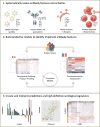Systems serology for evaluation of HIV vaccine trials
- PMID: 28133810
- PMCID: PMC5292205
- DOI: 10.1111/imr.12503
Systems serology for evaluation of HIV vaccine trials
Abstract
The scale and scope of the global epidemic, coupled to challenges with traditional vaccine development approaches, point toward a need for novel methodologies for HIV vaccine research. While the development of vaccines able to induce broadly neutralizing antibodies remains the ultimate goal, to date, vaccines continue to fail to induce these rare humoral immune responses. Conversely, growing evidence across vaccine platforms in both non-human primates and humans points to a role for polyclonal vaccine-induced antibody responses in protection from infection. These candidate vaccines, despite employing disparate viral vectors and immunization strategies, consistently identify a role for functional or non-traditional antibody activities as correlates of immunity. However, the precise mechanism(s) of action of these "binding" antibodies, their specific characteristics, and their ability to be selectively induced and/or potentiated to result in complete protection merits parallel investigation to neutralizing antibody-based vaccine design approaches. Ultimately, while neutralizing and functional antibody-based vaccine strategies need not be mutually exclusive, defining the specific characteristics of "protective" functional antibodies may provide a target immune profile to potentially induce more robust immunity against HIV. Specifically, one approach to guide the development of functional antibody-based vaccine strategies, termed "systems serology", offers an unbiased and comprehensive approach to systematically survey humoral immune responses, capturing the array of functions and humoral response characteristics that may be induced following vaccination with high resolution. Coupled to machine learning tools, large datasets that explore the "antibody-ome" offer a means to step back from anticipated correlates and mechanisms of protection and toward a more fundamental understanding of coordinated aspects of humoral immune responses, to more globally differentiate among vaccine candidates, and most critically, to identify the features of humoral immunity that distinguish protective from non-protective responses. Overall, the systematic serological approach described here aimed at broadly capturing the enormous biodiversity in antibody profiles that may emerge following vaccination, complements the existing cutting edge tools in the cellular immunology space that survey vaccine-induced polyfunctional cellular activity by flow cytometry, transcriptional profiling, epigenetic, and metabolomic analysis to offer a means to develop both a more nuanced and a more complete understanding of correlates of protection to support the design of functional vaccine strategies.
Keywords: Fc receptor; antibody; effector function; machine learning; vaccine.
© 2017 John Wiley & Sons A/S. Published by John Wiley & Sons Ltd.
Conflict of interest statement
The authors declare no competing financial interests. D.H.B. is a named co-inventor on vector, antigen, and protein patents (PCT/EP2007/052463, PCT/US2009/060494, PCT/US2009/064999).
Figures
Similar articles
-
Systems serology for decoding infection and vaccine-induced antibody responses to HIV-1.Curr Opin HIV AIDS. 2019 Jul;14(4):253-264. doi: 10.1097/COH.0000000000000558. Curr Opin HIV AIDS. 2019. PMID: 31033729 Free PMC article. Review.
-
Survivors Remorse: antibody-mediated protection against HIV-1.Immunol Rev. 2017 Jan;275(1):271-284. doi: 10.1111/imr.12510. Immunol Rev. 2017. PMID: 28133809 Free PMC article. Review.
-
Modulation of Vaccine-Induced CD4 T Cell Functional Profiles by Changes in Components of HIV Vaccine Regimens in Humans.J Virol. 2018 Nov 12;92(23):e01143-18. doi: 10.1128/JVI.01143-18. Print 2018 Dec 1. J Virol. 2018. PMID: 30209165 Free PMC article.
-
Systems serology: profiling vaccine induced humoral immunity against HIV.Retrovirology. 2017 Dec 21;14(1):57. doi: 10.1186/s12977-017-0380-3. Retrovirology. 2017. PMID: 29268769 Free PMC article. Review.
-
Bridging Vaccine-Induced HIV-1 Neutralizing and Effector Antibody Responses in Rabbit and Rhesus Macaque Animal Models.J Virol. 2019 May 1;93(10):e02119-18. doi: 10.1128/JVI.02119-18. Print 2019 May 15. J Virol. 2019. PMID: 30842326 Free PMC article.
Cited by
-
Expression Profiling and Glycan Engineering of IgG Subclass 1-4 in Nicotiana benthamiana.Front Bioeng Biotechnol. 2020 Jul 24;8:825. doi: 10.3389/fbioe.2020.00825. eCollection 2020. Front Bioeng Biotechnol. 2020. PMID: 32793574 Free PMC article.
-
Systems serology for decoding infection and vaccine-induced antibody responses to HIV-1.Curr Opin HIV AIDS. 2019 Jul;14(4):253-264. doi: 10.1097/COH.0000000000000558. Curr Opin HIV AIDS. 2019. PMID: 31033729 Free PMC article. Review.
-
Polyfunctional antibodies: a path towards precision vaccines for vulnerable populations.Front Immunol. 2023 Jun 27;14:1183727. doi: 10.3389/fimmu.2023.1183727. eCollection 2023. Front Immunol. 2023. PMID: 37600816 Free PMC article. Review.
-
Natural killer cell activation by respiratory syncytial virus-specific antibodies is decreased in infants with severe respiratory infections and correlates with Fc-glycosylation.Clin Transl Immunology. 2020 Feb 19;9(2):e1112. doi: 10.1002/cti2.1112. eCollection 2020. Clin Transl Immunology. 2020. PMID: 32099650 Free PMC article.
-
Persistence of viral RNA in lymph nodes in ART-suppressed SIV/SHIV-infected Rhesus Macaques.Nat Commun. 2021 Mar 5;12(1):1474. doi: 10.1038/s41467-021-21724-0. Nat Commun. 2021. PMID: 33674572 Free PMC article.
References
-
- Rappuoli R. Reverse vaccinology. Current opinion in microbiology. 2000;3(5):445–50. - PubMed
Publication types
MeSH terms
Substances
Grants and funding
- U19 AI078526/AI/NIAID NIH HHS/United States
- R01 AI102691/AI/NIAID NIH HHS/United States
- R37 AI080289/AI/NIAID NIH HHS/United States
- U19 AI095985/AI/NIAID NIH HHS/United States
- R01 AI084794/AI/NIAID NIH HHS/United States
- HHSN261200800001C/CA/NCI NIH HHS/United States
- U19 AI096040/AI/NIAID NIH HHS/United States
- R01 AI102660/AI/NIAID NIH HHS/United States
- R01 OD011170/OD/NIH HHS/United States
- HHSN261200800001E/CA/NCI NIH HHS/United States
- P30 AI060354/AI/NIAID NIH HHS/United States
- R01 AI080289/AI/NIAID NIH HHS/United States
LinkOut - more resources
Full Text Sources
Other Literature Sources
Medical


